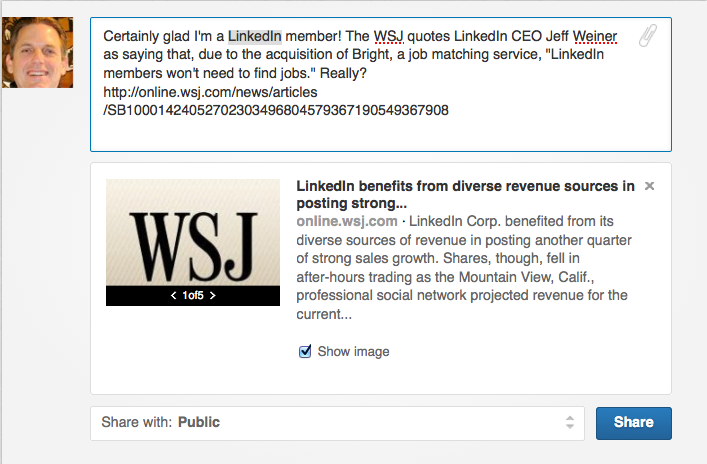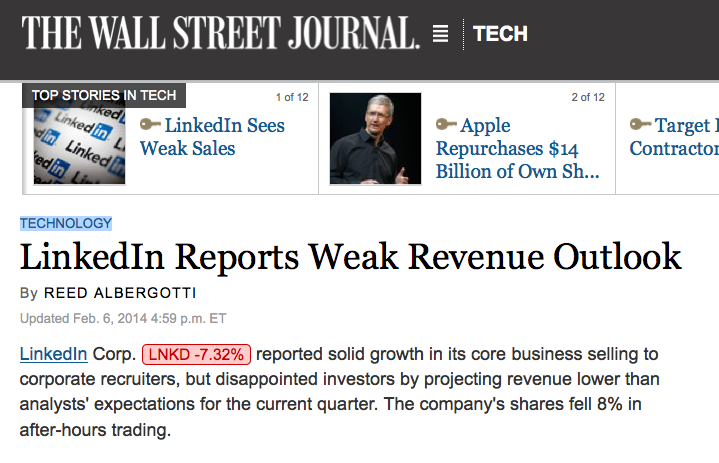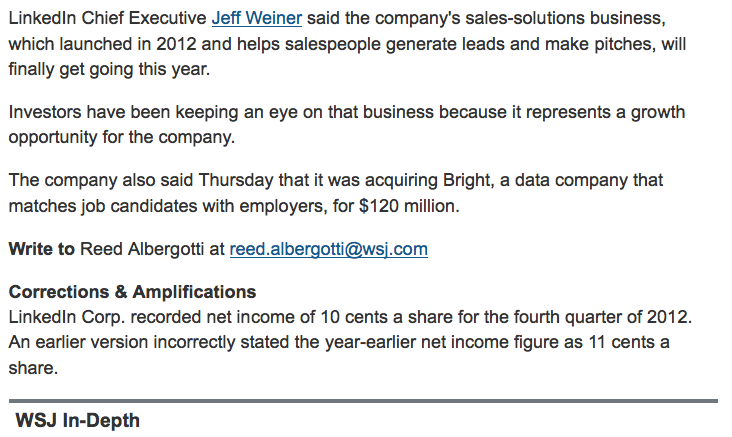I headed over to LinkedIn last week to make a snide comment about something I’d read in the newspaper — you know, those old ink-on-parchment documents publishers would print and then hand-carry to subscribers’ doors in order to share the news.
The CEO of LinkedIn had said something strange in an article in The Wall Street Journal, and I wanted to poke fun at it. Here’s the quote from WSJ:
[LinkedIn] also said Thursday that is was acquiring Bright, a data company that matches job candidates with employers, for $120 million. Mr. Weiner [LinkedIn’s Chief Executive] said that ultimately, because of Bright, LinkedIn members won’t need to find jobs.
Wow, that’s a compelling reason for becoming a LinkedIn member! Join and you’ll never need to look for a job again! I thought I should share this exciting news with my professional network on LinkedIn.
LinkedIn Alters News Links
So I signed into my LinkedIn account and posted a playful little jibe with a link to the story in The Wall Street Journal. Only there was something not quite right about the link. Here’s a screenshot of my post:

The headline on the WSJ link isn’t the same as the headline on the WSJ story. At first, I thought LinkedIn must have linked to the wrong story, or I must have posted an incorrect URL. But no! What happened was, LinkedIn changed the headline of the WSJ story. The headline in the print edition of WSJ and on the online version was identical: “LinkedIn Reports Weak Revenue Outlook,” but the headline on my status update was changed by LinkedIn to “LinkedIn benefits from diverse revenue sources in posting strong …”
What?!?
LinkedIn changed the headline of the WSJ link to say the opposite of what the original said. It also changed the WSJ‘s teaser paragraph or lead paragraph to remove phrases including “disappointed investors” and “shares fell 8%.” Here’s a screenshot of the headline and teaser text on The Wall Street Journal‘s website — notice any differences from LinkedIn’s version?

So, LinkedIn is intentionally changing the headlines and summary paragraphs of stories that LinkedIn members link to in their status updates. Way to practice journalism, LinkedIn. Does The Wall Street Journal know about this?
The Wall Street Journal Disappears Published Stories
Good luck fact-checking this story, Kiki. Anne “Kiki” Reinecke is our new senior editor at SixEstate. After more than 20 years as a copy editor at The Times-Picayune in New Orleans, Kiki now oversees the editing for all SixEstate client blogs. We edit every post before it’s published. Kiki is going to have a hard time fact-checking this post because The Wall Street Journal disappeared the original quote.
What?!?
Yes! If you go to the story on The Wall Street Journal’s website, you will no longer find the quote, “LinkedIn members won’t need to find jobs.” The quote was in the print edition, it was in the online edition when I posted my status update to LinkedIn, but it’s not there anymore.
Here’s the closing paragraph of the article, thanks to one of several sites (not WSJ) that archived the original article:

In the new, improved version of the article, the last sentence is lopped off. The “Corrections & Amplifications” section at the end of the WSJ article mentions nothing about removing the last sentence. I guess that’s not worth noting.

These Are the Standards of Our Torch Bearers
One more time for those who, like me, still can’t quite believe what’s happening here: I go to cite a news story on LinkedIn, and LinkedIn changes the headline of the story and the teaser paragraph to something less critical of LinkedIn. Then I go to fact-check the story, and discover that The Wall Street Journal has removed the embarrassing line from the story and, further, made a point of NOT including the change in a list of corrections made to the story.
Is this what happens in the electronic era to news that people find uncomfortable after it has been published? Does it just disappear into the memory hole? Is this how the No. 1 business network and the No. 1 business newspaper should behave?
Shame on you, LinkedIn. Shame on you, Wall Street Journal. Good luck, readers, trying to tell anyone about this post.
Source: “LinkedIn Reports Weak Revenue Outlook,” The Wall Street Journal, February 6, 2014.